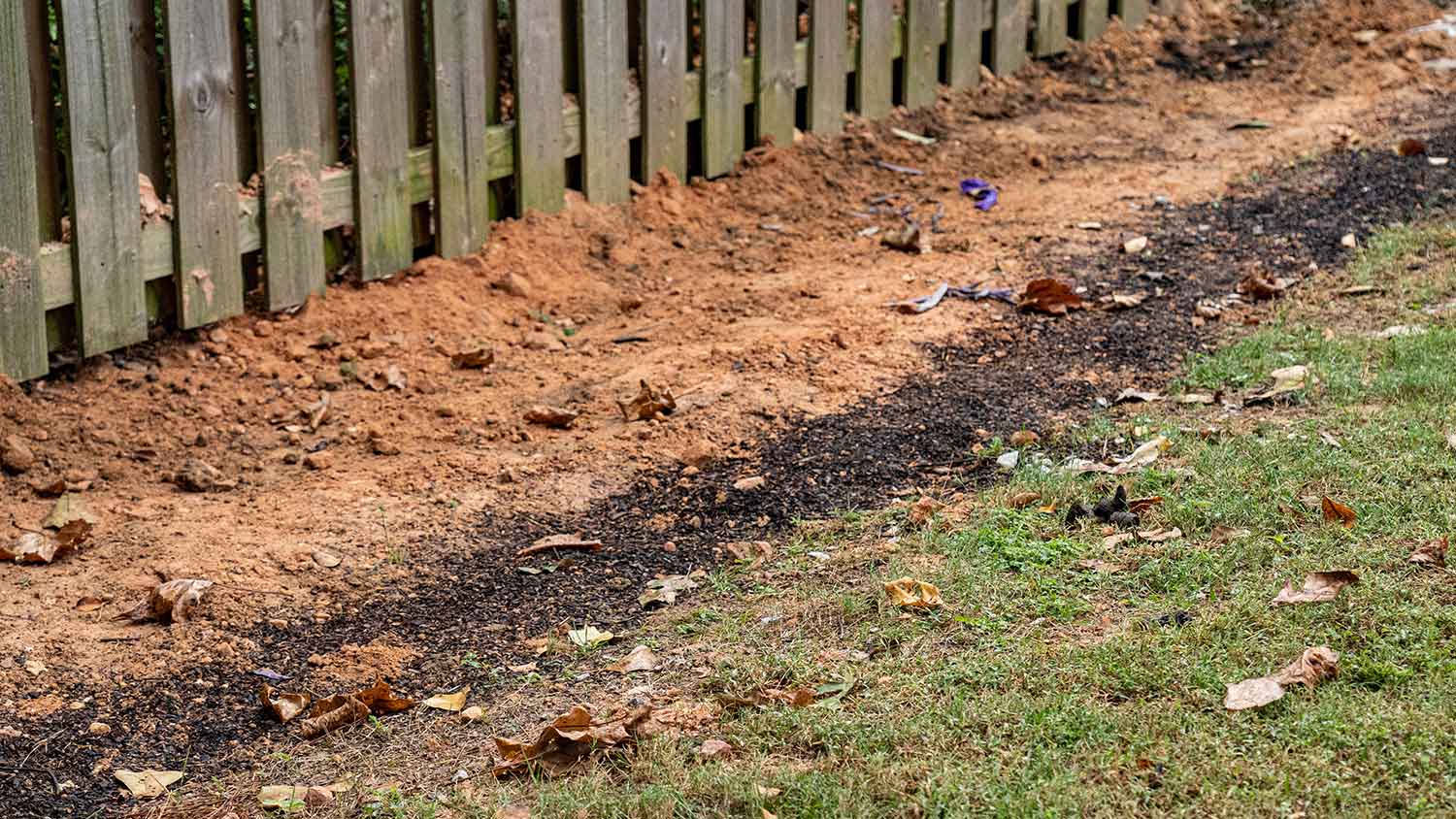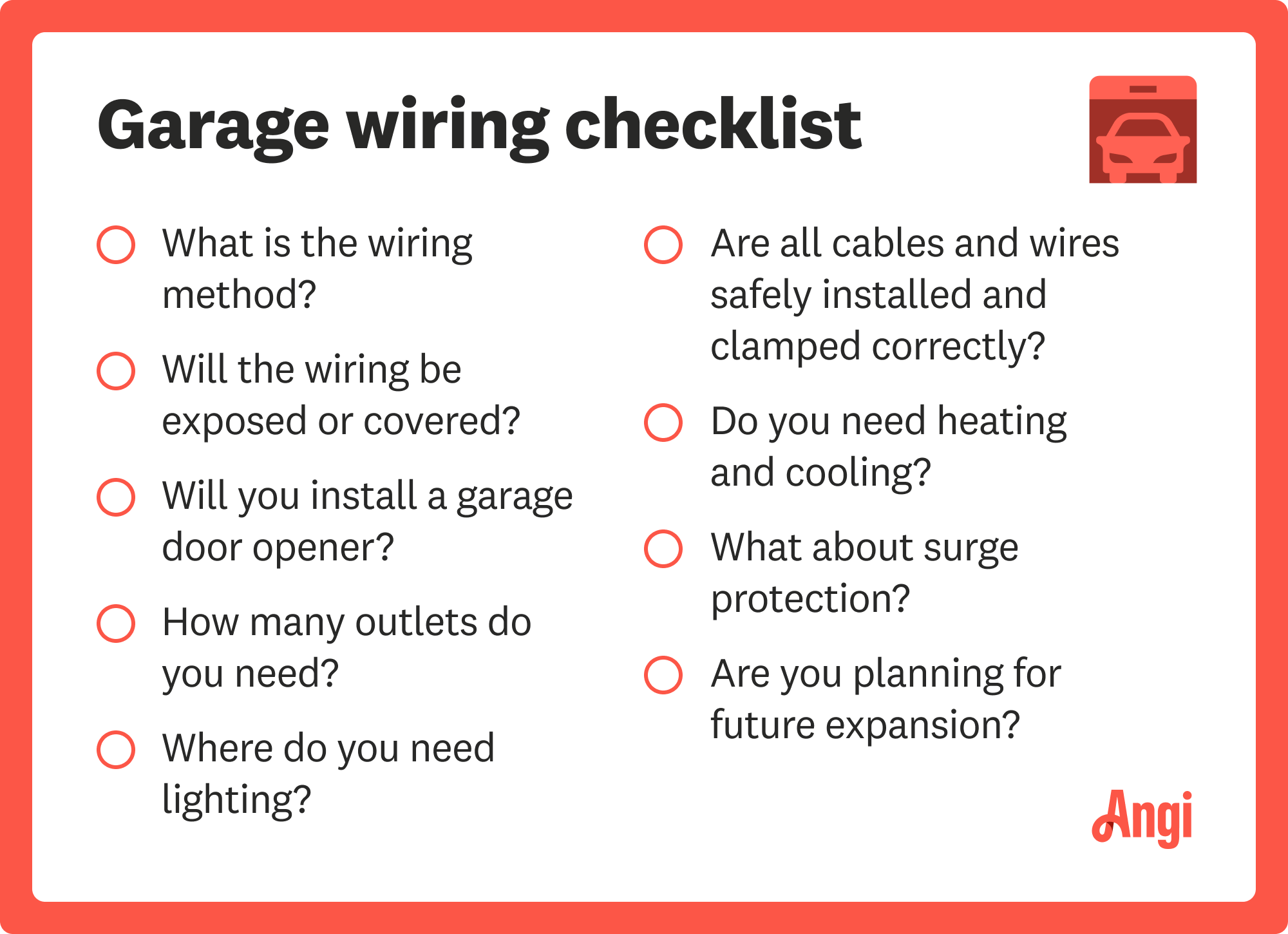
Wondering about the cost to ground a house? Pricing depends on the material of the rod and how much the electrician charges per hour.
Turn the lights—it’s worth it


This project requires a lot of experience, so we don’t recommend DIYing it. Hire a pro with the special skills and tools necessary to complete the job safely.
Picture this—your detached garage, currently home to a bunch of power tools and storage boxes, suddenly has lights. You turn that additional living space into a home office or an entertainment center, or even a workspace for your home improvement projects.
Sounds pretty great, but getting electricity to a detached garage does require lots of know-how and hard work. It’s the type of job best left to a local electrician, but what does the process look like? This guide explains how an electrician runs power to a detached garage.

Creating a safe and functional detached garage involves much more than running electrical wires. It requires the expertise of a professional electrician who understands the intricate details of electrical systems, local building codes, and safety standards. Here’s how they do it.
Hiring an electrician to install a new breaker box costs between $200 and $2,000. An electrician determines your electrical needs and selects an electrical panel based on several critical factors.
Load calculation: The electrician will assess your specific electrical requirements by factors such as the size of the space, the number and type of electrical devices, lighting, and HVAC systems.
Local codes and regulations: Electricians will select a breaker box that complies with these codes that dictate the type of panel, its location, the number of circuits, grounding requirements, and other safety measures.
Wiring and conduit needs: Based on the load calculation and equipment requirements, the electrician will determine the size and type of wiring and conduit needed to connect the electrical panel to the various circuits and outlets in the garage.
Budget and cost considerations: Finally, the electrician will work within your budget constraints to select a breaker box that meets your needs while keeping costs reasonable.

Before beginning the project, you or your electrician must call to ensure no buried gas lines or electric cables are already present beneath your yard. Failure to do so could result in serious injury, not to mention expensive repairs, fines, or disrupted utility services to your home.
811 is the national call-before-you-dig hotline to call. Never skip this step before your pro starts this project.

Electricians rarely do the excavating themselves, but you’ll likely need to dig (or hire someone to dig) a foot-deep trench that runs from your home to the point of installation in your detached garage.
Digging a trench usually costs between $800 for 100 linear feet of digging, although this price can change depending on the difficulty of the terrain. You can hire a local excavation company to do this job.
Keep in mind this is just part of your budget. Powering up your outdoor living space will likely cost between $1,000 and $2,500 on average. In this trench, your electrician will bury a UF-B cable, which is a waterproof cable that transports electricity to your garage.

In many cases, especially for homes with a foundation that is just slightly outward away from the home, an electrician will need to install a pipe that runs from the insertion point of your home into the ground. Otherwise, you’ll have an exposed UF-B cable above the ground.
Conduit pipes are a popular option here, as they can be heated up and bent to fit sleekly along the existing contours of your home. Once this is in place, the electrician can run the UF-B cable from the new breaker box to the existing panel inside your home.

Your electrician or a local electrical company also won’t contribute to this part, but it will be a required step to complete this job. A local trench digging or excavation company can tackle this job, or maybe even a handyman if they have experience.
Using a bag of sand to fill in the base of the trench you've dug serves as a warning for future diggers—possibly even the next homeowners of your current residence—that electric cables lay below it.
It’s also a good idea to put down red electrical tape on top of the sand, then cover it with dirt.

Your home’s electricity must be turned off before starting any wiring, which should always be tackled by a professional electrician.
Finally, your electrician will connect your detached garage to the main power source. This job involves identifying and wiring together electrical cables and should only be tackled by someone with a true understanding of what they’re doing. Any other situation could pose a serious safety hazard.
Once completed, turn your power back on and, well, let there be light! (Or a cold fridge, or whatever it is that you needed electricity for in your detached garage.)
Electrical work in a detached garage should start with thoroughly assessing your needs. Consider the intended use of the space, such as a workshop, storage area, or home office, and work with a licensed electrician to determine the electrical load requirements for lighting, outlets, and any power tools or appliances you plan to use.
When wiring a detached garage, ask yourself the following questions to ensure a safe and functional electrical installation.

According to data from Angi customers, electrical installations or repairs are common for garage remodels, with 14% of remodels needing some electrical work. Additionally, 12% of people update their garage doors, which require their own wiring setup. Call an electrician if you’re planning a large garage remodel soon.
The price range for installing electrical wiring in a garage falls between $1,000 and $2,500. However, it's essential to remember that expenses may escalate in cases where you need to open up drywall or when extra outlets are required to power various appliances.
The expense of extending electrical power to a detached garage falls within the range of $1,000 to $2,500, contingent upon factors like your electrical requirements and whether any drywall modifications are necessary for new wiring. If substantial electrical work is required, like an upgraded electrical panel, the project's cost may escalate, potentially reaching figures of $4,000 to $5,000 or even more.
Consult with a local electrician who can assess your needs and provide a detailed cost breakdown based on your circumstances and local regulations.
If you plan to DIY, you must obtain a permit before beginning work and schedule an inspection afterward for code compliance. Only attempt the project if you have extensive electrical experience and a thorough understanding of how to be code-compliant. Remember, many licensed professionals guarantee their work, providing peace of mind.
Your out-of-pocket expense depends on the project. On average, you may save $162 to $535—the cost of hiring a licensed electrician. The exact amount depends on the scope of work, and your materials cost will be just as high. Unless you’re a pro, attempting DIY this project is not worth the savings.
Hiring a professional electrician in your area for electrical work in your garage is a wise decision for several important reasons.
Safety: Electrical work can be hazardous, especially if not done correctly. A professional electrician is trained and experienced in adhering to safety protocols, minimizing the risk of accidents, electrical shocks, and fires.
Compliance: They will ensure that your garage's electrical installation complies with all the necessary codes and permits.
Work quality: Professionals have the expertise to perform high-quality work. They will use suitable materials, tools, and techniques to ensure a reliable and long-lasting electrical system in your garage.
Insurance and liability: In case of accidents, damage, or electrical failures, the electrician's insurance will typically cover the costs.
Efficiency: Professionals work efficiently and can complete the job in a reasonable timeframe. This means less disruption to your daily routine and faster access to electricity in your garage.
Raufi Services helped us upgrade our electrical panel and did a great job!
Good to work with trust haven solution they provided good service for my computer I will also recommend their services to others also. They are very timely with their monthly checks and reminders to have service completed.
From average costs to expert advice, get all the answers you need to get your job done.

Wondering about the cost to ground a house? Pricing depends on the material of the rod and how much the electrician charges per hour.

Whether you’re shopping for a new home or simply doing a safety check on your current place, learn what factors influence an electrical inspection cost.

The cost of a whole-house surge protector depends on the materials, size, installation, and more. This guide will help you budget for a new surge protector.

If your home contains original aluminum wiring, you may want to take action to avoid danger. Learn why aluminum wires are hazardous and how you can address these issues safely.

When installing a new 200-amp service panel, the right wire size is critical to ensuring sufficient amperage.

Learn a new skill and find out how to wire a light switch (safely) in your own home. This is one project that’s sure to light up your day.